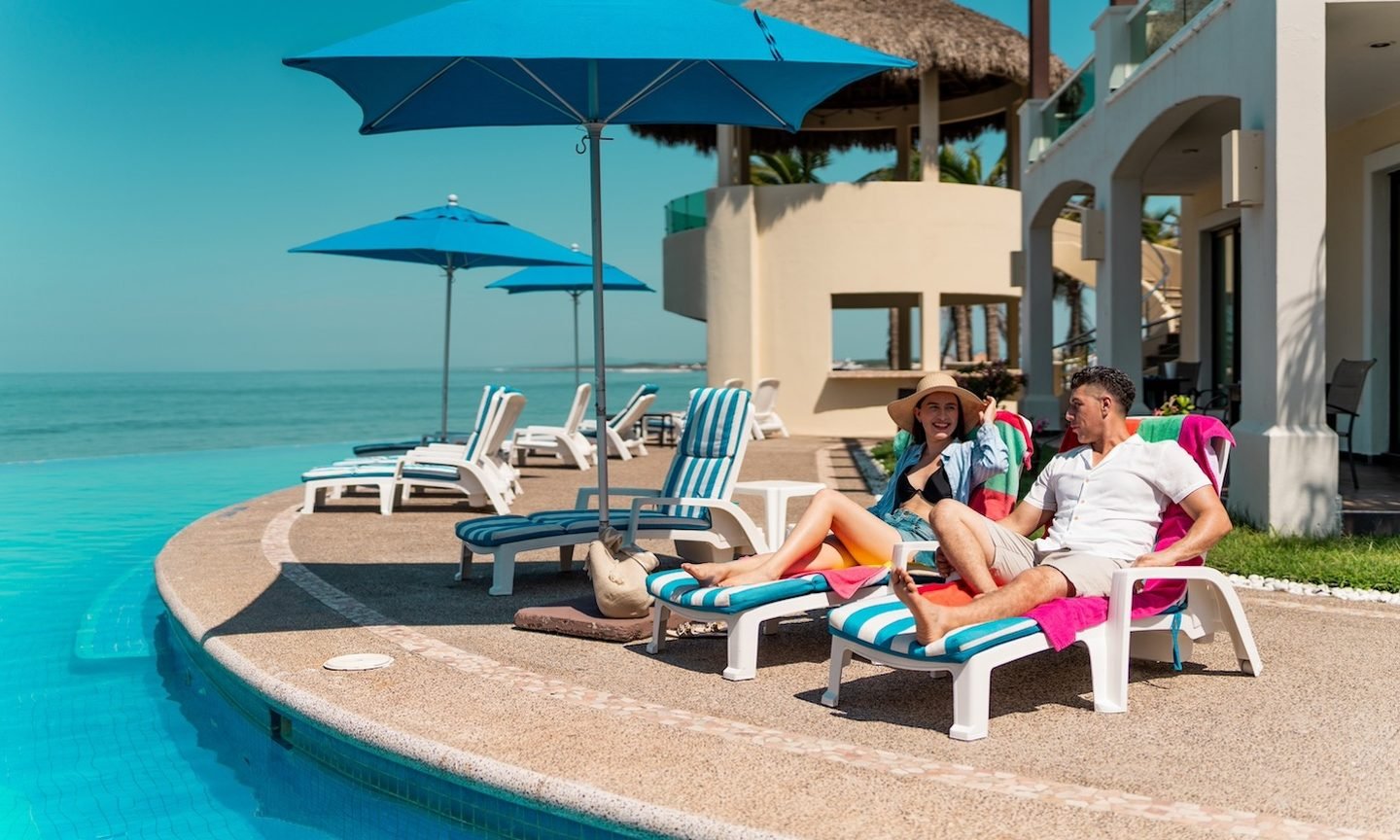How Timeshare Presentations Earn Me Cheap Travel
Crunch the numbers to make sure a promotional stay is worth it, and hold the line when it comes time to say "no."

Many or all of the products on this page are from partners who compensate us when you click to or take an action on their website, but this does not influence our evaluations or ratings. Our opinions are our own.
The most avid travel hackers often shoot me a skeptical glare when I utter the words “timeshare presentation” as a way to get discounted hotel stays and piles of points to use toward future travel.
The deal is pretty simple: receive a heavily discounted hotel or resort stay and other perks in exchange for attending a timeshare presentation — better known as a sales pitch.
The last email offer I received was in March 2023 from Hilton Grand Vacations. It dangled a three-night stay in Las Vegas plus 50,000 Hilton Honors points in exchange for $149 and sitting through a 90-minute talk.
Having attended four timeshare presentations over the last decade, I find that the discounted hotel stay and extra perks — like hotel points and discounted spa treatments or amusement park tickets — are worth my time. All you have to do is attend the presentation and say “no” (sometimes several times) if the timeshare is not right for you.
Here’s how to get nearly free vacations with timeshare presentations.
Get the 'Cheat Codes' to Cheaper Travel
Unlocking the secret to saving a ton on travel is easier than you think. 📤 Our free newsletter shows you how in 5 min. or less.

Determine the value of the promotion, then negotiate
I've successfully negotiated the terms of a timeshare presentation in the past, so I called Hilton to see if it could sweeten the deal with upgrades like more travel rewards points or food and beverage credits.
After reviewing the terms of my promotion — and with some very polite back and forth — I requested an increase to 100,000 points and a waiver on the additional resort fees of $34 per night. After a long wait, the sales representative’s supervisor approved the deal if I accepted it on the spot, which I did.
According to NerdWallet’s valuation, Hilton points are generally worth about 0.4 cent each, giving the 100,000 points an approximate value of $500. The nightly room rate over my travel dates was $249, plus $34 per night in resort fees. That gives this deal a value of over $1,300 in exchange for 90-minutes of my time and the $149 I paid for the package.
Understand the restrictions and limitations
Certain hotels require attending the presentation with a spouse, while others may have specific income requirements. Ask about blackout dates, package expiration dates and any other hidden fees (like those pesky resort fees).
For Hilton, I had to verbally confirm my income was above a certain threshold and attest that I hadn’t participated in another Hilton-based timeshare presentation over the past six months.
Once I purchased the package, Hilton gave me 12 months to use it. After my reservation in Las Vegas was booked, Hilton assigned a set date and time for the timeshare presentation. If you miss it, the company can charge the full cash rate for the stay and revoke any perks offered.
Also be aware that you won't earn hotel points or elite night credits with the host brand for the promotional stay.
Know what to expect at the sales pitch
The pitch usually starts with an introduction to your salesperson and a general video or presentation about the company’s timeshare program. You’ll then be whisked away to an office, where the salesperson asks about your finances and travel habits. You’ll be introduced to a rubric of costs to stay at different tiers of properties — costs that may fluctuate seasonally or during periods of high demand.
Many timeshare companies, even Disney, have transitioned to a points-based system, where you buy points used to make reservations after you’re an “owner,” but be aware these points are independent of the chain’s loyalty program.
Once the salesperson estimates the cost required to live your best timeshare life, they’ll take you on a tour of a model property. You’ll then return to the office and be introduced to the “closer” — the person who ran the numbers and tries to pressure you into signing.
The sales professionals will tug at your emotions with aspirational travel fantasies while making you feel like family. Remember, they are incentivized by commissions to make you buy a timeshare through signing a contract that can last the rest of your life.
🤓 Nerdy Tip
Timing the pitch using my phone allowed me to politely tell the salesperson their time was up once the required duration under the promotion elapsed (usually 90 to 120 minutes). Be in the 'no'
Timeshares are big business, with $10.6 billion in domestic sales in 2023, according to a 2024 study by the American Resort Development Association (ARDA), a trade association for the timeshare industry. For comparison, that’s similar to the annual revenue of Major League Baseball in 2023.
Hospitality companies wouldn’t offer these lucrative promotions unless enough people were buying what they’re selling.
Jason Gamel, president and CEO of ARDA, says that approximately 2 in 10 people decide to buy after a sales presentation. And that purchase, of course, comes with a financial commitment. The average purchase transaction was $24,170 in 2023, according to the ARDA study, with average annual interest rates near 15%.
This amount covers the initial cost to join the timeshare and the financing of the balance but does not include ongoing costs such as membership dues, maintenance fees or other required resort operation expenses.
If you’re not in the market for a timeshare, no sales pitch should persuade you to get one. Before the pitch, think (or talk) through the process of saying “no,” and if you have a spouse who'll be attending, include them in the conversation.
Later, if you change your mind and decide to sign a contract, a state’s rescission laws could allow the contract to be canceled within a certain window after signing — usually between five and 10 business days.
“I think that’s important because it does help people evaluate whether they’re making the right decision for them, and it gives them a very easy way to say no after everything is said and done," says Gamel.
Simply pack up and go
Despite skepticism from my travel-hacking cohorts, timeshare promotions allow me to save money on travel now and earn rewards to use for free travel in the future. The process won’t be for everyone, but if you’re willing to sacrifice a couple of hours and know the power of saying “no,” it could do the same for you.
How to maximize your rewards
You want a travel credit card that prioritizes what’s important to you. Here are some of the best travel credit cards of 2026:
- Flexibility, point transfers and a large bonus: Chase Sapphire Preferred® Card
- No annual fee: Wells Fargo Autograph® Card
- Flat-rate travel rewards: Capital One Venture Rewards Credit Card
- Bonus travel rewards and high-end perks: Chase Sapphire Reserve®
- Luxury perks: American Express Platinum Card®
- Business travelers: Ink Business Preferred® Credit Card
Article sources
NerdWallet writers are subject matter authorities who use primary,
trustworthy sources to inform their work, including peer-reviewed
studies, government websites, academic research and interviews with
industry experts. All content is fact-checked for accuracy, timeliness
and relevance. You can learn more about NerdWallet's high
standards for journalism by reading our
editorial guidelines.
Limited Time Only: Earn $1,000 Toward Travel!
Capital One Venture Rewards Credit Card 
Travel

For a limited time, the
Capital One Venture Rewards Credit Card is offering new cardholders an especially rich bonus: Enjoy $250 to use on Capital One Travel in your first cardholder year, plus earn 75,000 bonus miles once you spend $4,000 on purchases within the first 3 months from account opening - that’s equal to $1,000 in travel!
More like this
Related articles







